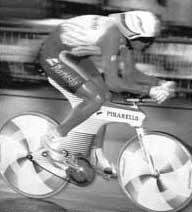Bicycle
was a bicycle. And all bikes have the same characteristics: two wheels and a pedal system coupled to a chain.
The bike we see today both on the streets and in cycling competitions took its first steps two hundred years ago. The truth is that in no case would we put the name of bicycle to that gadget, but that first attempt was only the beginning.
The Frenchman Sivrac looked at a toy knight, a wooden horse that was used to balance the children and thought of putting wheels on the toy. He put the wheels on him, but the gadget still had no pedals. Therefore, the only remedy was to sit on the horse and push first with one foot and then with the other to the ground to go forward and back. These efforts to turn the toy horse into a bicycle are the XVIII. At the end of the twentieth century, around 1790, the French performed and during the next almost thirty years the horse did not advance.
In 1816 a German placed the horse the Drais von Sauerbronn barons, the seat and the handlebar. The easel was very uncomfortable to push with the feet and the one who sat on the gadget made a great favor the seat and handlebar. The vehicle that was gradually being completed was called “draisiana”, in honor of the inventor.
Pedaling
The seat and handlebar improved the gadget, however, the push with the feet was laborious and put pedals. The French Pierre and Ernest Michaux invented the pedals and from 1860 the feet were pedalized without having to push. Just pull the foot to the ground to stay, as the brake system had not yet been invented. The French presented their important discovery at the Paris World Exhibition in 1867 and achieved great success.

Thanks to the success obtained, the vehicle called bicycle was made known throughout Europe. Fascinated by the novelty, people began cycling on velodrome and conditioned tracks. On the streets, however, no bicycle was seen. Although the vehicle was increasingly comfortable, the wheels were made of wood or steel and the fact of cycling through the swept and drilled streets was an adventure. However, walking down the softest track was as difficult as walking down the streets.
The Michaux brothers tied the pedals to the front wheel shaft and had to increase the diameter of the front wheel to ride well on a bicycle. The diameters of some wheels became even metro and a half. Thus, the large diameter of the wheel allowed the bivouons to be two meters high. Since the two wheels were of different dimensions, the maintenance of the front wheel in its direction was very complicated and moved without left-right control. In addition, the braking system and the rider who was going to jump to stay were not yet invented. More than one took the pan jumping to the ground from a height of two meters, both when descending from the bike and losing balance. Despite the dangers, faced with the success of the bicycle at the Paris, UK and France Exhibition began to organize cycling competitions.
First bike
XVIII. After the first steps and numerous efforts made by the bicycle at the end of the 20th century, it can be said that the current bicycle emerged in 1880. Until then they were only approximations. Harry Lawson is considered the creator of the bicycle. Lawson put the chain to the rear wheel. Even if it seems a lie, the gadgets until then had no chains. The chain was not the only novelty of the first bike. Lawson's bicycle also had a frame that supported the two wheels, seat, pedals and handlebar. However, the front wheel was still larger than the rear. We had to wait five years to see the bicycle wheels of the same size. With the two wheels of the same size, the balance problems ended and it was not necessary to make a jump of two meters to stay the bike.
Despite the chain, frame and other components, the bike was not suitable. Like so many others, the Irish Dunlop realized the biggest mistake of the bike: the wheels were made of wood, steel or a rubber ring. These materials were very bad for wheels and it was very difficult to ride a bicycle. The Irish Dunlop made rubber wheels in 1890 and made the first test with his son's bike. The improvement was such that six years later the bicycle championship was played at the Athens Olympic Games.
It has been a century since then and the bike has had time to improve a lot in those hundred years. Today the bicycle has become a profession for some. However, most use bicycles to play sports and to combat street pollution, in large cities it has also become ecological transport. Regardless of its use, the bike has found a wide market and the novelties happen. The bikes are very light yet robust. The change system is also becoming more complex and the wheel rim and spokes are becoming increasingly rare. There is nothing more to see than the bike Indurain used to break the record he had suffered.





